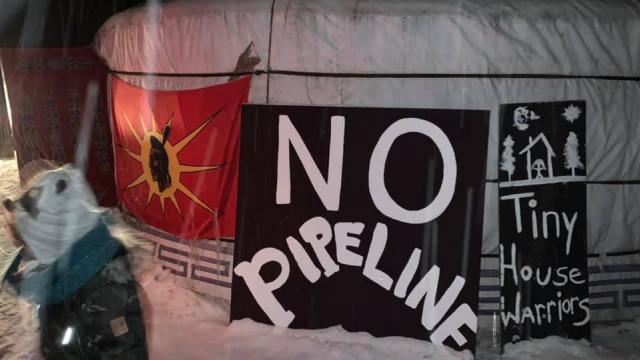First Nations folks have urged Canada to stop building the Trans Mountain Pipeline, which carries crude and refined oil from Alberta to British Columbia, for years. A new United Nations report is backing them up.
The UN Committee for the Elimination of Racial Discrimination (CERD) has ordered Canada to halt construction on the pipeline unless officials obtain informed consent from impacted Indigenous peoples, saying the projects would “cause irreparable harm to indigenous peoples rights, culture, lands, territories and way of life.” Fifty per cent of the proposed route for the Trans Mountain Pipeline is on Secwepemc territory.
“We have un-ceded land, which means we have never signed treaties with the federal government,” Kanahus Manuel, one of the Indigenous activists who brought the human rights violations to the UN CERD’s attention, told Earther. “We’ve never signed our land away, we have rights to it … so self-determination for our people must be respected.”
Manuel is a member of the Tiny House Warriors, who are fighting to stop the pipeline’s construction by building their homes along Secwepemc land which it crosses. In October, she was violently arrested for defying an eviction order, leaving her with a broken wrist.
The UN committee said Manuel’s arrest and detainment “alarmed” them, and that they were “disturbed by the forced removal, disproportionate use of force, harassment and intimidation by law enforcement officials against indigenous peoples who peacefully oppose large-scale development projects on their traditional territories.”
“We hope that the government will actually listen and respect international human rights and international human rights standards,” said Manuel, speaking from her tiny house on the pipeline’s planned route. “Hopefully this will give them a real slap in the face.”
The UN body also ordered Canada to cease work on the Site C hydroelectric dam and the Coastal GasLink pipeline, both in British Columbia, unless they obtain consent from Indigenous groups those projects would impact. The UN Declaration on the Rights of Indigenous Peoples, which Canada adopted in 2016 but has not incorporated into law, calls for “free, prior and informed consent” from First Nations communities in matters affecting them.
Alberta’s energy minister Sonya Savage said the UN has no business criticising Canada’s energy megaprojects, which she says most First Nations groups support. “With all the injustice in the world, it’s beyond rich that the unelected, unaccountable United Nations would seemingly single out Canada—one of the greatest champions of human rights, democracy and the rule of law,” she said in a statement.
But the CERD report says Canada’s legal practices for obtaining consent from Indigenous communities don’t meet global human rights standards. “By UN standards, there is no there’s no consent for this pipeline [from the land’s] rightful titleholders,” said Manuel.
Manuel says the human rights violations go beyond the sites of the planned infrastructure expansion. “We have to remember that this pipeline is transporting bitumen from the Alberta tar sands,” she said. “The communities there around the Alberta tar sands are being devastated. Their water is undrinkable. … They’re living on bottled water advisories … they’ve been bathing in bottled water that has to be shipped in,” she said. If that bitumen leaks from the pipeline, Manuel says, it would wreak the same kind of havoc on her community.
Secwepemc territory is also facing extreme weather fuelled by climate change. This week, temperatures in the community of Blue River will drop to negative 7 degrees Fahrenheit. “That’s climate change this oil and gas industry, this energy industry, is causing by building these pipelines in the first place,” said Manuel.
Manuel says the UN report is an important first step to securing justice for First Nations peoples. “But it’s going to take a lot of pressure, not just from the community here and our movement, but also from the global community and human rights organisations around the world,” she said.
Amnesty International has agreed to launch an investigation into the Trans Mountain Pipeline’s consequences for Indigenous communities, and activists will be calling on the UN’s special rapporteur on human rights to visit the site where Tiny House Warriors are blocking the pipeline’s expansion.
“We need organisations and human rights groups and United Nations bodies to stand with us because we’ve been silenced for too long,” Manuel said.
